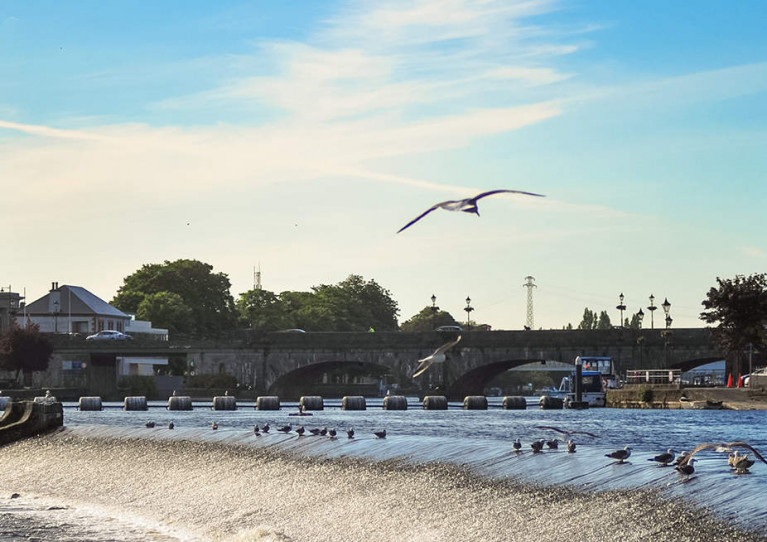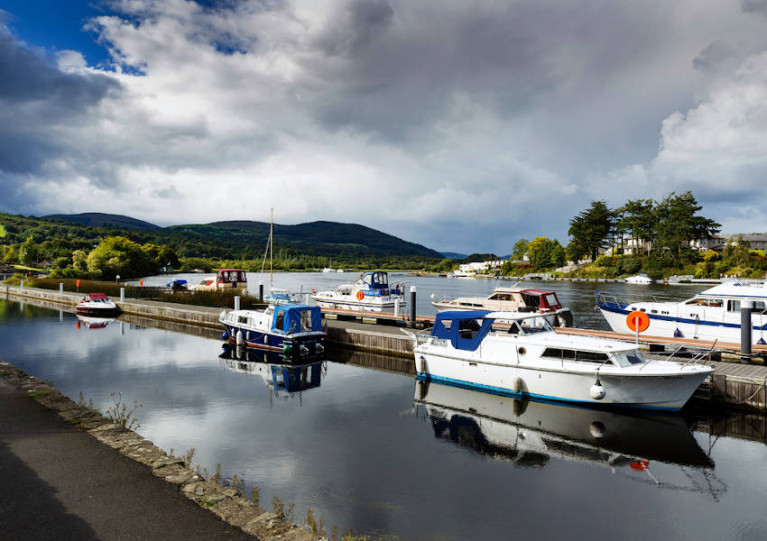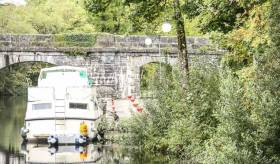Displaying items by tag: Winter Mooring
Winter Mooring Period Ends This Weekend on Shannon Navigation and Shannon Erne Waterway
Waterways Ireland advises masters of vessels that the winter mooring period will end this Easter Sunday, 31 March, on the Shannon Navigation and Shannon-Erne Waterway.
Shannon Navigation Bye-law No. 17(3) will apply from 31 March, such that vessels should not berth in the same harbour for longer than the statutory period of five consecutive days nor more than a total of seven days in any one month.
Services were reconnected to Waterways Ireland harbours and jetties from Friday 15 March, the cross-border body for Ireland’s inland waterways adds.
Shannon Boating News: Winter Mooring Reminder, Navigation Aids Off Station and Dromod Pump-Out Back Online
Waterways Ireland advises masters that the winter mooring period for public harbours on the Shannon Navigation and Shannon-Erne Waterway will commence on Wednesday 1 November and will end on 31 March next year.
Masters wishing to avail of winter mooring are required to pay the winter mooring fee of €63.50 prior to 1 November. Online registration must be made on the Waterways Ireland website.
The steps in the winter mooring process are as follows:
- Apply online for winter mooring at a specific harbour.
- Receive email approval/rejection/alternative location of application.
- Follow link on approval email when received to pay winter mooring fee online.
Masters are reminded that Bye-Law 17, the ‘five consecutive days/seven days in one month’ rule, continues to apply for masters not availing of winter mooring.
Waterways Ireland will be disconnecting its electricity supply points and water supply at public moorings for the winter period (November–March). Both services will be reinstated prior to the commencement of the 2024 boating season.
Owners should note that vessels are moored in public harbours at the owners risk at all times and may be directed to other harbours as operational exigencies require.
In other news, the cross-border body for Ireland’s inland waterways advises that two green conical aids to navigation — No 1248 upstream of Parteen Weir and No 500 upstream of Lanesboro Bridge — are currently off station. Mariners are requested to exercise care when navigating in these area.
Meanwhile, in Dromod Harbour in Co Leitrim the pump-out station is now fully operational.
Waterways Ireland advises masters of vessels on the Shannon Navigation and Shannon-Erne Waterway that the 2022-23 winter mooring period for public harbours on these navigations has ended as of Friday 31 March.
The cross-border body for Ireland’s inland waterways adds that Shannon Navigation Bye-law No. 17(3) now applies: vessels should not berth in the same harbour for longer than the statutory period of five consecutive days nor more than a total of seven days in any one month.
Register Now for Winter Mooring on the Shannon Navigation and Shannon-Erne Waterway
Waterways Ireland advises masters of vessels on the Shannon Navigation and Shannon-Erne Waterway that the winter mooring period for public harbours on these navigations will commence on Tuesday 1 November.
Masters wishing to avail of winter mooring — which continues until 31 March 2023 — are required to register online and pay the winter mooring fee of €63.50 prior to 1 November.
Masters must apply for winter mooring at a specific harbour. They will then receive by email their approval, rejection or an alternative location of application. Upon approval, follow the link in the email to pay the required fee online.
Masters are reminded that Bye-law 17 of the Canals Act — the “5 consecutive days/ 7 days in one month rule” — continues to apply for those not availing of winter mooring.
Waterways Ireland says it will be disconnecting its electricity supply points and water supply at public moorings for the winter period. Both services will be reinstated prior to the commencement of the 2023 boating season, the cross-border body for Ireland’s inland waterways adds.
Owners are urged to note that vessels are moored in public harbours at the owners risk at all times and may be directed to other harbours “as operational exigencies require”.
Waterways Ireland reminds masters of vessels on the Shannon Navigation and Shannon-Erne Waterway that the winter mooring period for these inland waterways ended last Thursday 31 March.
Shannon Navigation Bye-Law No 17(3) now applies, such that vessels should not berth in the same harbour for longer than the statutory period of five consecutive days nor more than a total of seven days in any one month.
Registrations Now Open for Winter Mooring on Shannon Navigation & Shannon-Erne Waterway
Waterways Ireland advises masters of vessels that the winter mooring period for public harbours on the Shannon Navigation and Shannon-Erne Waterway will commence on Monday 1 November and will end on 31 March 2022.
Masters wishing to avail of winter mooring on these inland waterways are required to pay the €63.50 fee prior to 1 November. Online registration must be made on the Waterways Ireland website HERE.
To apply, the following steps are involved:
- Apply online for Winter Mooring at a specific harbour.
- Receive email approval/rejection/alternative location of application.
- Follow link on approval email when received to pay winter mooring fee online.
Masters are reminded that Bye-law 17 — the “five consecutive days/seven days in one month” rule — continues to apply for masters not availing of winter mooring.
Waterways Ireland says it will be disconnecting its electricity supply points and water supply at public moorings for the winter period. Both services will be reinstated prior to the commencement of the 2022 boating season.
Masters are also reminded that vessels are moored in public harbours at the owner’s risk at all times and may be directed to other harbours as required.
Waterways Ireland reminds masters on the Shannon Navigation and Shannon-Erne Waterway that the winter mooring period for public harbours will commence this Sunday 1 November and continue until 31 March 2021.
Masters wishing to avail of winter mooring on these inland waterways are required to pay the €63.50 fee online before this Sunday. Registration is available at the Waterways Ireland website HERE.
To register, for winter mooring, go by the following steps:
- Apply for mooring at a specific harbour
- Receive email approval/rejection/alternative location of application
- Follow link on approval email when received to pay winter mooring fee online
Masters are reminded that Bye-law 17 — the ‘five consecutive days/seven days in one month rule’ — will continue to apply for masters not availing of winter mooring when the Covid-19 Level 5 restrictions are eased.
Waterways Ireland will be disconnecting its electricity supply points and water supply at public moorings for the winter period. Both services will be reinstated prior to the 2021 boating season.
Owners are urged to note that vessels berthed in public harbours are at the owners’ risk at all times and may be directed to other harbours as required by Waterways Ireland.
Waterways Ireland Suspends Five-Day Mooring Rule Amid Nationwide Level 3 Restrictions
Waterways Ireland has suspended the five-day mooring rule until late October in the wake of the country’s move to Level 3 coronavirus restrictions.
As of this past Wednesday 7 October, the rule — which prohibits vessels from mooring in one spot for more than five days — has been suspended across Ireland's inland waterways for a three-week period until Tuesday 27 October, at which point restrictions will be reviewed.
Shortly after this, the winter mooring period commences on Sunday 1 November and owners of vessels can apply for permits at the Waterways Ireland website.
All locks, bridges and facilities on the Shannon Navigation and Shannon-Erne Waterway remain open at the scheduled times with the exception of Portora Lock in Enniskillen, which will be temporary closed to boat traffic from 9am to 5pm next Wednesday 14 October for essential maintenance.
Masters of vessels and waterways users in the Republic are also reminded that in accordance with Level 3 restrictions, non-essential travel outside your home county is not allowed at present.
Shannon Navigation Winter Mooring Period Commences on 1st Nov 2017
Waterways Ireland is advising masters that the winter mooring period for public harbours on the above navigation will commence on 1st Nov 2017 and end on the 31st Mar 2018.
Masters are advised that the associated charges, €63.50, must be paid prior to 1st Nov 2017.
Masters are further reminded that Bye-law 17. Mooring and use of Harbours i.e. the "5 Day Rule" continues to apply during this period and that masters not wishing to avail of winter mooring should continue to observe the mooring time limits for public harbours.
Payment may be made by cheque, bank draft or postal order, made payable to Waterways Ireland, Scarriff Harbour, Ballyminoge, Scarrif, Co. Clare, Ireland. Credit/Debit card payments may be made by contacting Finance Section, Waterways Ireland, Enniskillen, Tel: 048 6632 3004 (from RoI)
Masters should also note that fresh water and electricity supply may not be available during this period at public moorings therefore any on-board services which may be depending on this electrical supply should have an alternative source of power.
Winter Berths Options For 2015-16 Season
#WinterBerths - The winter mooring period for 2015-16 is coming up fast, and Ireland's boat owners will undoubtedly be looking for the best deals available.
Last week we put out a call for details on winter packages available from Ireland's marinas and harbours, and those in the Dublin area can benefit from the most options.
As previously reported, Howth Yacht Club got a head start on the competition with their comprehensive winter package, which includes access to the club's full range of facilities and marine services. A few kilometres north, Malahide Marina also offers special rates for winter berthage.
On the south side of Dublin Bay, winter boat storage is always at a premium. But Dun Laoghaire Marina presently has two deals on offer, with winter berthing on the marina for €135/m, as well as a combined package with MGM Boatyard for discounted marina berthing plus lift-out and anti-foul (call 01 202 0040 for details).
The 5 Gold Anchor marina also hosts a full calendar of winter racing with the Dublin Bay Sailing Club for those who may not want to hang up their sailing gear just yet.
It also emphasises that its staff check the marina's moored boats daily to avoid such catastrophes as the grounded yacht off Hook Head last week, which is thought to have slipped free of its moorings.
At the Royal St George, winter lift-out comes early – on Saturday 10 October, just over a week from now – with winter parking allocated on a first come, first served basis. In addition, the club reminds that the usual members rate is not available this season. More details can be found HERE.
Nearby, Western Marine at Dalkey's Bullock Harbour has had a number of upgrades for its latest winter storage season, with its crane once again fully operational (€50 per standard lift-out of 3.5 tonnes and under).
Mains power is available, with no additional cost for use of light power tools, and water can be sourced from a public tap outside the entrance. More details of their services and rates, including special offer discounts, are available HERE.
Further down the coast, Greystones Harbour Marina is providing winter berthing from October to March for €185 per metres. And in the city centre, Poolbeg Marina in Ringsend sees its winter berthing season begin this Thursday 1 October, with rates from €100 per metre.
It's a similar story around the country, with the venerable Royal Cork, for example, offering a rate €25 per foot for winter storage from 1 November.
On the Shannon Navigation and Shannon-Erne Waterway, the winter mooring period for public harbours begins on 1 November, running till 31 March 2016.
Masters are requested to pay the winter mooring fee of €63.50 before 1 November, and are reminded that the 'five-day rule' still applies for those not wishing to avail of winter mooring.
Those looking for some more security for their vessels will want to go private. Butlers Marina in Carrick-on-Shannon offers indoor winter berthage in its secured marina, while Manor Marine on Lough Erne offers both hard stand storage and winter berthing.
And it's not just boats that need berthing or storage or winterising over the coming months.
Rather than leave your lifejackets on board to risk getting damp and attracting mildew while you're not using them, why not have them stored safety by professionals?
Boaters in the UK at least can benefit from SeaSafe's offer of winter lifejacket servicing from over 50 centres around Britain. Servicing starts at £9.95 and SeaSafe will store your PFD till you need it when the 2016 season arrives - or any time in between.
If there are any Irish operations that offer a similar service, we'd love to hear from you.
And if you're a harbour or marina operator with winter berths to offer this season, please leave your details with us (below in comments) or email to [email protected] so they can be added here.
































































